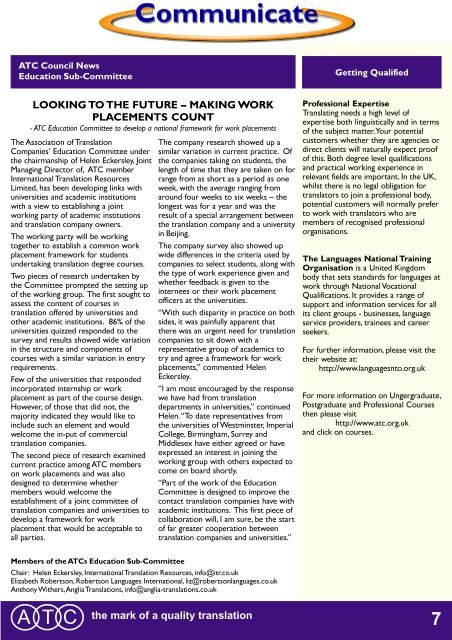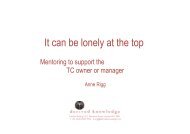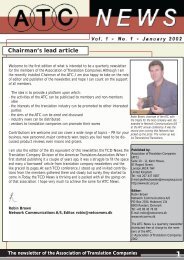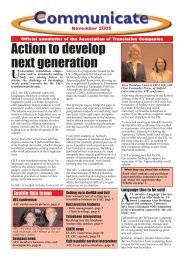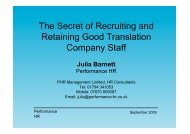ATC News, October 2002 - Association of Translation Companies
ATC News, October 2002 - Association of Translation Companies
ATC News, October 2002 - Association of Translation Companies
Create successful ePaper yourself
Turn your PDF publications into a flip-book with our unique Google optimized e-Paper software.
<strong>ATC</strong> Council <strong>News</strong>Education Sub-CommitteeGetting QualifiedLOOKING TO THE FUTURE – MAKING WORKPLACEMENTS COUNT- <strong>ATC</strong> Education Committee to develop a national framework for work placementsThe <strong>Association</strong> <strong>of</strong> <strong>Translation</strong><strong>Companies</strong>’ Education Committee underthe chairmanship <strong>of</strong> Helen Eckersley, JointManaging Director <strong>of</strong>, <strong>ATC</strong> memberInternational <strong>Translation</strong> ResourcesLimited, has been developing links withuniversities and academic institutionswith a view to establishing a jointworking party <strong>of</strong> academic institutionsand translation company owners.The working party will be workingtogether to establish a common workplacement framework for studentsundertaking translation degree courses.Two pieces <strong>of</strong> research undertaken bythe Committee prompted the setting up<strong>of</strong> the working group. The first sought toassess the content <strong>of</strong> courses intranslation <strong>of</strong>fered by universities andother academic institutions. 86% <strong>of</strong> theuniversities quizzed responded to thesurvey and results showed wide variationin the structure and components <strong>of</strong>courses with a similar variation in entryrequirements.Few <strong>of</strong> the universities that respondedincorporated internship or workplacement as part <strong>of</strong> the course design.However, <strong>of</strong> those that did not, themajority indicated they would like toinclude such an element and wouldwelcome the in-put <strong>of</strong> commercialtranslation companies.The second piece <strong>of</strong> research examinedcurrent practice among <strong>ATC</strong> memberson work placements and was alsodesigned to determine whethermembers would welcome theestablishment <strong>of</strong> a joint committee <strong>of</strong>translation companies and universities todevelop a framework for workplacement that would be acceptable toall parties.The company research showed up asimilar variation in current practice. Ofthe companies taking on students, thelength <strong>of</strong> time that they are taken on forrange from as short as a period as oneweek, with the average ranging fromaround four weeks to six weeks – thelongest was for a year and was theresult <strong>of</strong> a special arrangement betweenthe translation company and a universityin Beijing.The company survey also showed upwide differences in the criteria used bycompanies to select students, along withthe type <strong>of</strong> work experience given andwhether feedback is given to theinternees or their work placement<strong>of</strong>ficers at the universities.“With such disparity in practice on bothsides, it was painfully apparent thatthere was an urgent need for translationcompanies to sit down with arepresentative group <strong>of</strong> academics totry and agree a framework for workplacements,” commented HelenEckersley.“I am most encouraged by the responsewe have had from translationdepartments in universities,” continuedHelen. “To date representatives fromthe universities <strong>of</strong> Westminster, ImperialCollege, Birmingham, Surrey andMiddlesex have either agreed or haveexpressed an interest in joining theworking group with others expected tocome on board shortly.“Part <strong>of</strong> the work <strong>of</strong> the EducationCommittee is designed to improve thecontact translation companies have withacademic institutions. This first piece <strong>of</strong>collaboration will, I am sure, be the start<strong>of</strong> far greater cooperation betweentranslation companies and universities.”Pr<strong>of</strong>essional ExpertiseTranslating needs a high level <strong>of</strong>expertise both linguistically and in terms<strong>of</strong> the subject matter. Your potentialcustomers whether they are agencies ordirect clients will naturally expect pro<strong>of</strong><strong>of</strong> this. Both degree level qualificationsand practical working experience inrelevant fields are important. In the UK,whilst there is no legal obligation fortranslators to join a pr<strong>of</strong>essional body,potential customers will normally preferto work with translators who aremembers <strong>of</strong> recognised pr<strong>of</strong>essionalorganisations.The Languages National TrainingOrganisation is a United Kingdombody that sets standards for languages atwork through National VocationalQualifications. It provides a range <strong>of</strong>support and information services for allits client groups - businesses, languageservice providers, trainees and careerseekers.For further information, please visit thetheir website at:http://www.languagesnto.org.ukFor more information on Ungergraduate,Postgraduate and Pr<strong>of</strong>essional Coursesthen please visithttp://www.atc.org.ukand click on courses.Members <strong>of</strong> the <strong>ATC</strong>s Education Sub-CommitteeChair: Helen Eckersley, International <strong>Translation</strong> Resources, info@itr.co.ukElizabeth Robertson, Robertson Languages International, liz@robertsonlanguages.co.ukAnthony Withers, Anglia <strong>Translation</strong>s, info@anglia-translations.co.ukA T Cthe mark <strong>of</strong> a quality translation7


